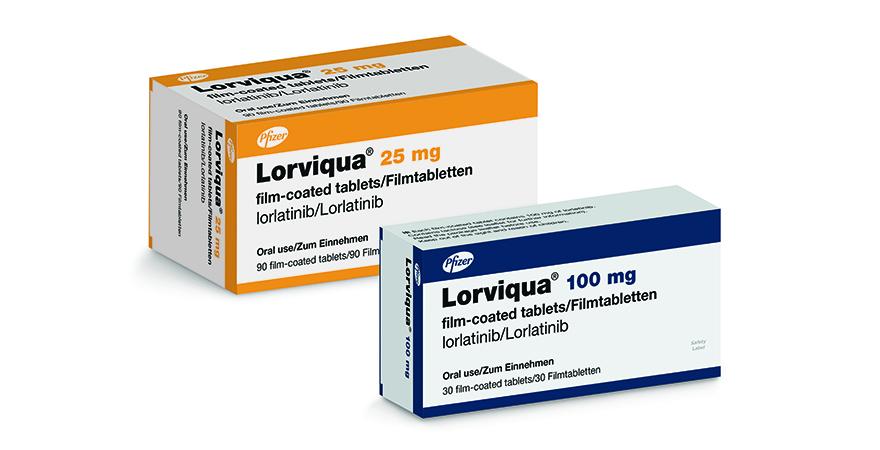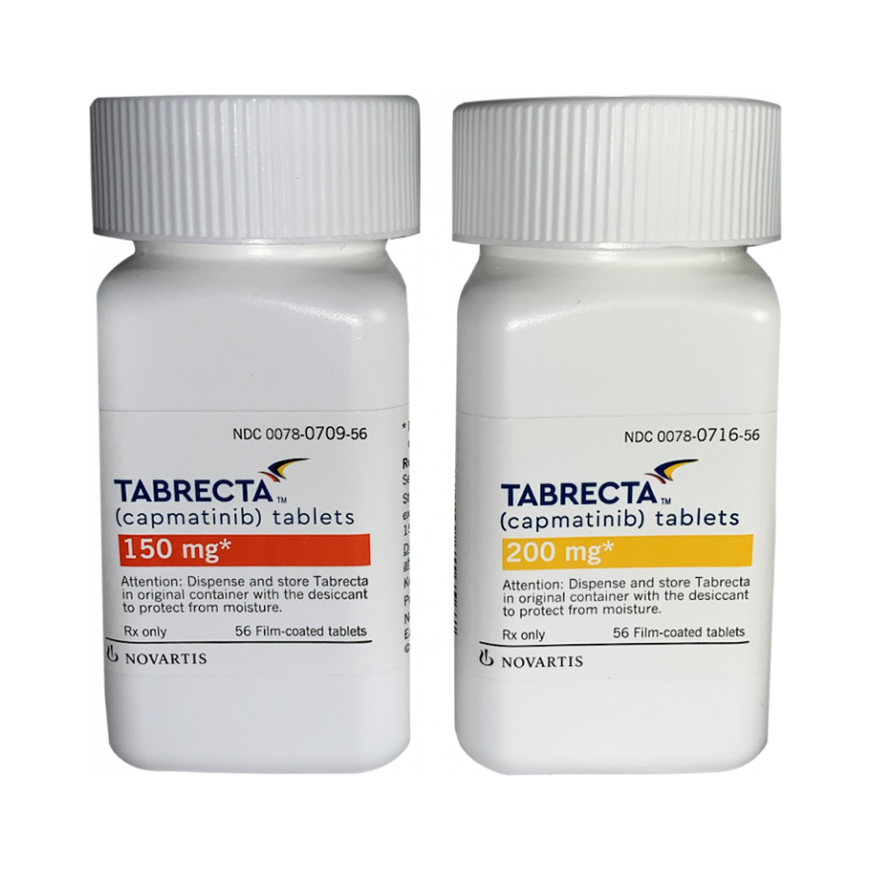Lorviqua (lorlatinib) vs Tabrecta (capmatinib)
Lorviqua (lorlatinib) vs Tabrecta (capmatinib)
Lorviqua (lorlatinib) is a third-generation anaplastic lymphoma kinase (ALK) inhibitor used for the treatment of ALK-positive metastatic non-small cell lung cancer (NSCLC), particularly in patients who have progressed on other ALK inhibitors. Tabrecta (capmatinib) is a selective MET inhibitor indicated for adult patients with metastatic NSCLC harboring MET exon 14 skipping mutations. When deciding between Lorviqua and Tabrecta, it is crucial to determine the specific genetic alterations present in the cancer, as Lorviqua is tailored for ALK mutations while Tabrecta targets MET exon 14 skipping mutations, and the efficacy of each drug is dependent on the presence of their respective target mutations.
Difference between Lorviqua and Tabrecta
| Metric | Lorviqua (lorlatinib) | Tabrecta (capmatinib) |
|---|---|---|
| Generic name | lorlatinib | capmatinib |
| Indications | Used for the treatment of patients with anaplastic lymphoma kinase (ALK)-positive metastatic non-small cell lung cancer (NSCLC) | Used for the treatment of adult patients with metastatic non-small cell lung cancer (NSCLC) whose tumors have a mutation that leads to MET exon 14 skipping |
| Mechanism of action | ALK and ROS1 tyrosine kinase inhibitor | MET kinase inhibitor |
| Brand names | Lorviqua | Tabrecta |
| Administrative route | Oral | Oral |
| Side effects | Hypercholesterolemia, hypertriglyceridemia, edema, peripheral neuropathy, cognitive effects, fatigue, weight gain, arthralgia, mood effects, diarrhea | Nausea, vomiting, fatigue, edema, decreased appetite, weight decreased, cough, dyspnea |
| Contraindications | Hypersensitivity to lorlatinib or any of its excipients | Hypersensitivity to capmatinib or any of its excipients |
| Drug class | Tyrosine kinase inhibitor | Tyrosine kinase inhibitor |
| Manufacturer | Pfizer | Novartis |
Efficacy
Lorviqua (lorlatinib) Efficacy in Lung Cancer
Lorviqua, also known by its generic name lorlatinib, is a medication specifically designed for the treatment of non-small cell lung cancer (NSCLC) with an anaplastic lymphoma kinase (ALK) mutation. This targeted therapy has shown significant efficacy in patients who have progressed on prior ALK inhibitors. Clinical trials have demonstrated that lorlatinib is effective in treating both treatment-naive patients and those who have developed resistance to other ALK inhibitors. The response rates in these trials were notable, with a considerable proportion of patients experiencing tumor shrinkage or disease stabilization. Lorlatinib has also shown the ability to cross the blood-brain barrier, making it effective in treating brain metastases, which are common in ALK-positive NSCLC.
Tabrecta (capmatinib) Efficacy in Lung Cancer
Tabrecta, with the generic name capmatinib, is another targeted therapy approved for the treatment of NSCLC, but it is specifically indicated for patients whose tumors have a mutation that leads to MET exon 14 skipping. Capmatinib has been shown to be effective in patients with this genetic alteration, which is present in a small subset of NSCLC cases. In clinical studies, capmatinib demonstrated significant anti-tumor activity, with a meaningful number of patients achieving partial responses or stable disease. The drug's efficacy has been observed in both previously treated patients and those who are treatment-naive, indicating its potential as a first-line therapy for MET exon 14-altered NSCLC.
Both Lorviqua and Tabrecta represent advances in the personalized treatment of lung cancer, offering new hope for patients with specific genetic mutations. Their development underscores the importance of molecular testing in the management of NSCLC, as identifying the presence of ALK mutations or MET exon 14 skipping is crucial for selecting the appropriate therapy. The efficacy of these drugs highlights the shift towards targeted treatments in oncology, which aim to improve outcomes by exploiting the unique characteristics of a patient's tumor.
It is important to note that while Lorviqua and Tabrecta have shown efficacy in their respective patient populations, their use should be guided by a healthcare professional with expertise in cancer treatment. The decision to use these medications must be based on a comprehensive evaluation of the patient's health status, cancer characteristics, and the presence of specific genetic markers that indicate the likelihood of a positive response to the therapy.
Regulatory Agency Approvals
Lorviqua
-
European Medical Agency (EMA), European Union

-
Food and Drug Administration (FDA), USA

-
Health Canada

-
Therapeutic Goods Administration (TGA), Australia

Tabrecta
-
European Medical Agency (EMA), European Union

-
Food and Drug Administration (FDA), USA

-
Pharmaceuticals and Medical Devices Agency (PMDA), Japan

Access Lorviqua or Tabrecta today
If Lorviqua or Tabrecta are not approved or available in your country (e.g. due to supply issues), you can access them via Everyone.org.
How it works

Make an enquiry
Choose the medicine you want to buy, answer a couple of questions, and upload your prescription to speed things up. We’ll get back to you within 24 hours.


Make an enquiry
Choose the medicine you want to buy, answer a couple of questions, and upload your prescription to speed things up. We’ll get back to you within 24 hours.


Breeze through the paperwork
We'll guide you through the required documents for importing unapproved medicine, ensuring you have all the necessary information.


Get a personalized quote
We’ll prepare a quote for you, including medicine costs and any shipping, administrative, or import fees that may apply.


Receive your medicine
Accept the quote and we’ll handle the rest - sourcing and safely delivering your medicine.

Some text on this page has been automatically generated. Speak to your physician before you start a new treatment or medication.
Let's talk
If you have any questions, call us or send us a message through WhatsApp or email:
Contact us




